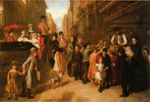
Love Is More
"'Art is much, but love is more'" (9.656).
Elizabeth Barrett Browning's Aurora Leigh (1856)
Points for Reflection
Aurora Leigh, Book Nine
- what did Romney ask Lady Waldemar to do while he was recovering, following the destruction of Leigh Hall?
- does Lady Waldemar’s letter exonerate her (8.1-172), or do we consider her responsible for Marian's fate?
- what clues does E.B.B. scatter throughout Books Eight and Nine to prepare the reader for the big reveal concerning Romney’s physical condition?
- within just a few lines, Aurora goes from denying her love of Romney (7.173-74) to admitting that she misses, desires and, indeed, loves him passionately (7.196), to denying again that she loves him (7.197-98). What necessary catalyst finally occurs, forcing her to recognize and deal with her feelings?
- how was Romney injured?
- are Marian’s reflections on a relationship with Romney still shaped by Lady Waldemar’s influence?
- why does Marian refuse the offer given her by Romney?
- Marian claims that she likely never loved Romney—is she convincing?
- what is the final, relational repercussion of Marian’s earlier, drugged rape(s) at the brothel?
- is Marian’s assertion that she can live more happily without a husband convincing (9.312-52)?
- in what ways does Romney’s disability surprisingly prove to be a blessing?
- despite what she asserts (9.607-26 and following), is Aurora Leigh’s love merely a product of intense pity?
- why might EBB avoid sharing with us the details of Romney’s loving response to Aurora’s own declaration of love (9.713-759)?
- what is the significance of Aurora’s comments about the “ecstasy / Of Darkness” in lines 9.814-33?
- which form of improving humanity does the verse-novel ultimately privilege, Aurora’s former, artistic focus on the soul/spirit, or Romney’s focus on material conditions?
- in the marriage model forwarded by Elizabeth Barrett Browning in the last few pages of Aurora Leigh, how are typical Victorian conventions challenged?
- in Book Five, Aurora Leigh claimed that literary epics like those of Homer are still possible of creation because “all men [are] possible heroes” (5.139-52). Would it be appropriate to label any of the characters in this verse-novel an epic hero?

Poverty and Wealth (1889)
William Powell Frith
Dr. Paul Marchbanks
pmarchba@calpoly.edu
Last Modified: 09/03/2021 20:25:06
![]()
